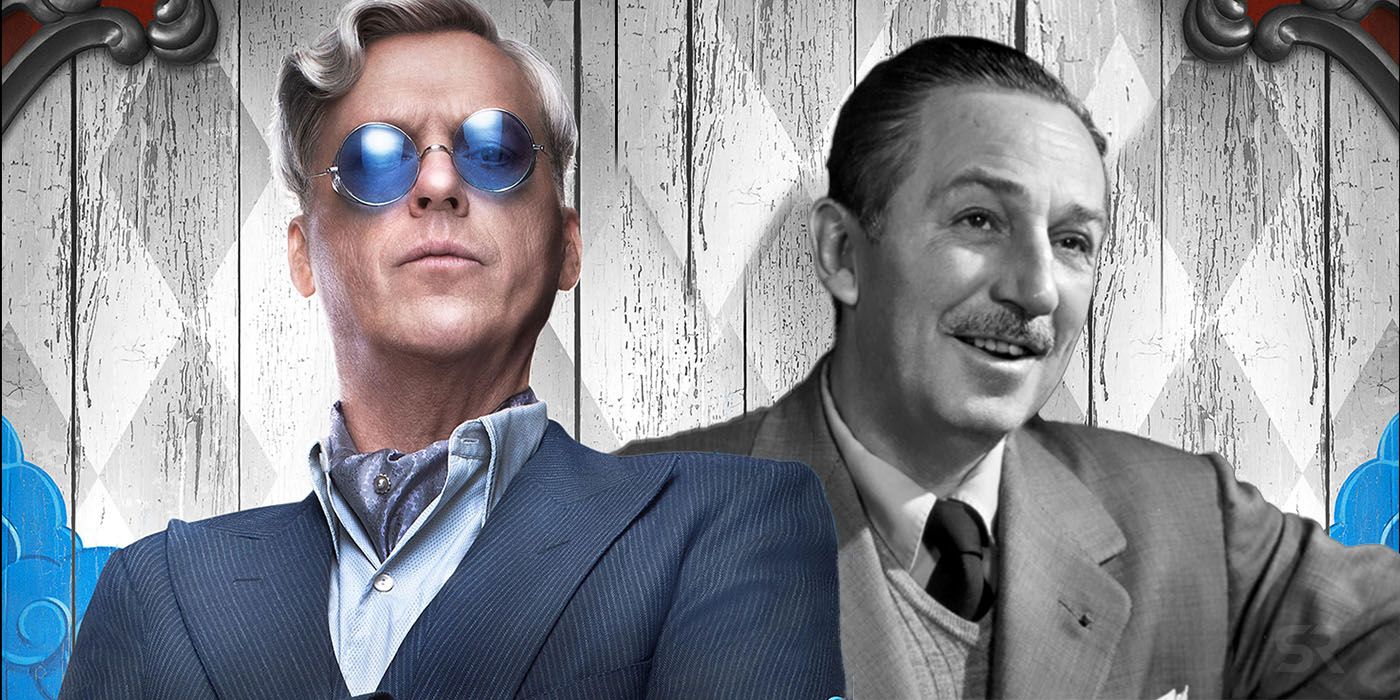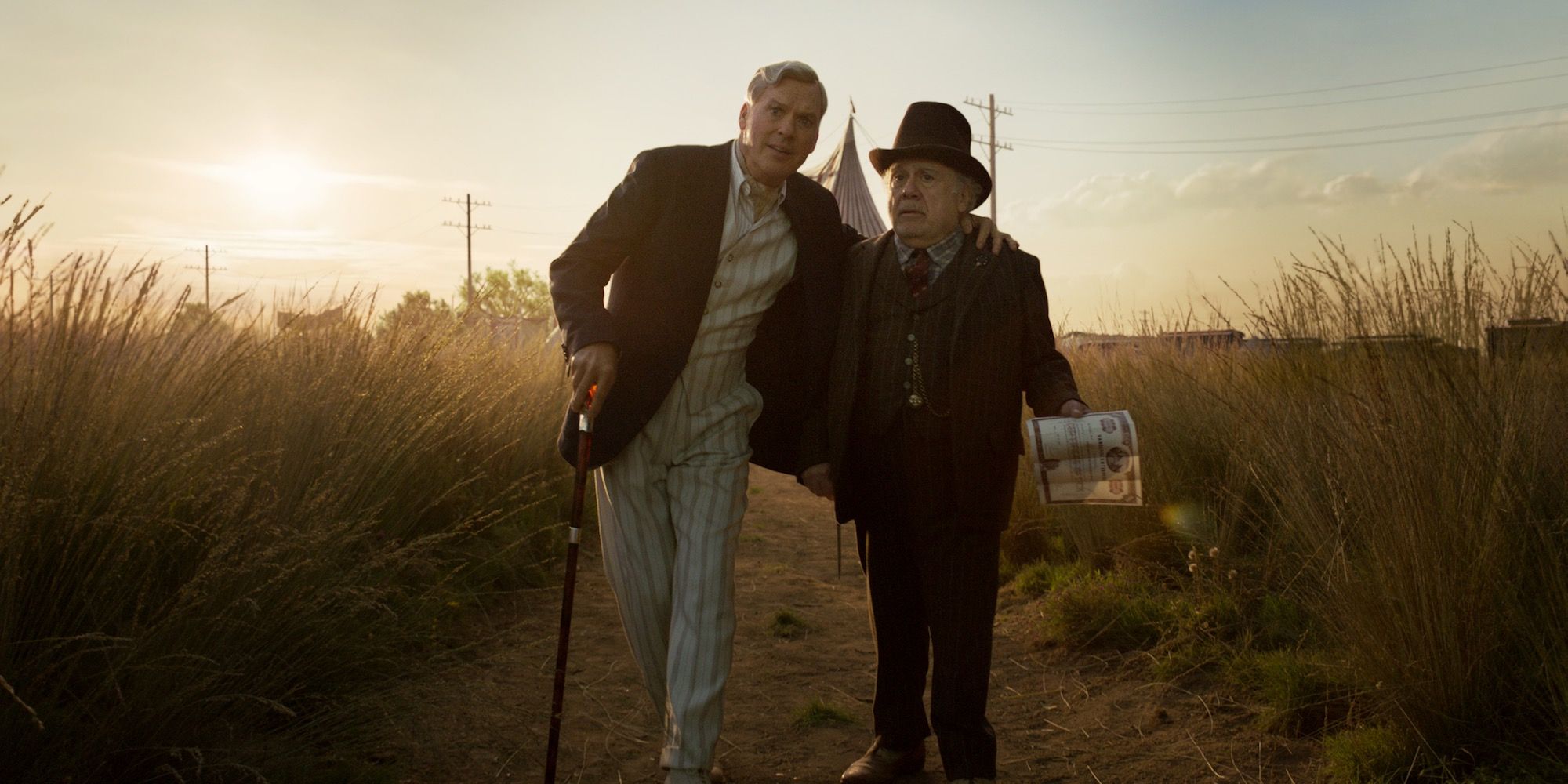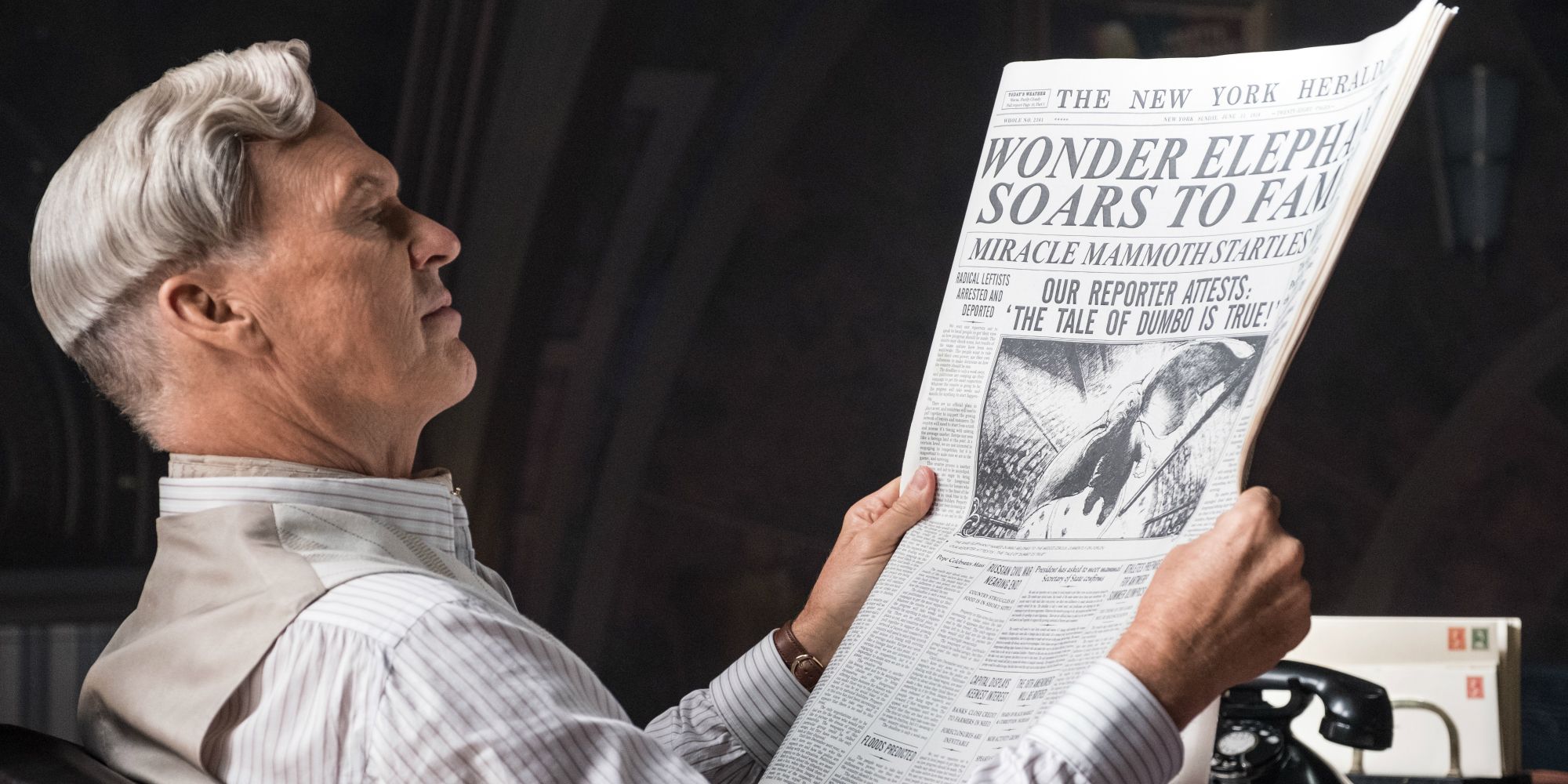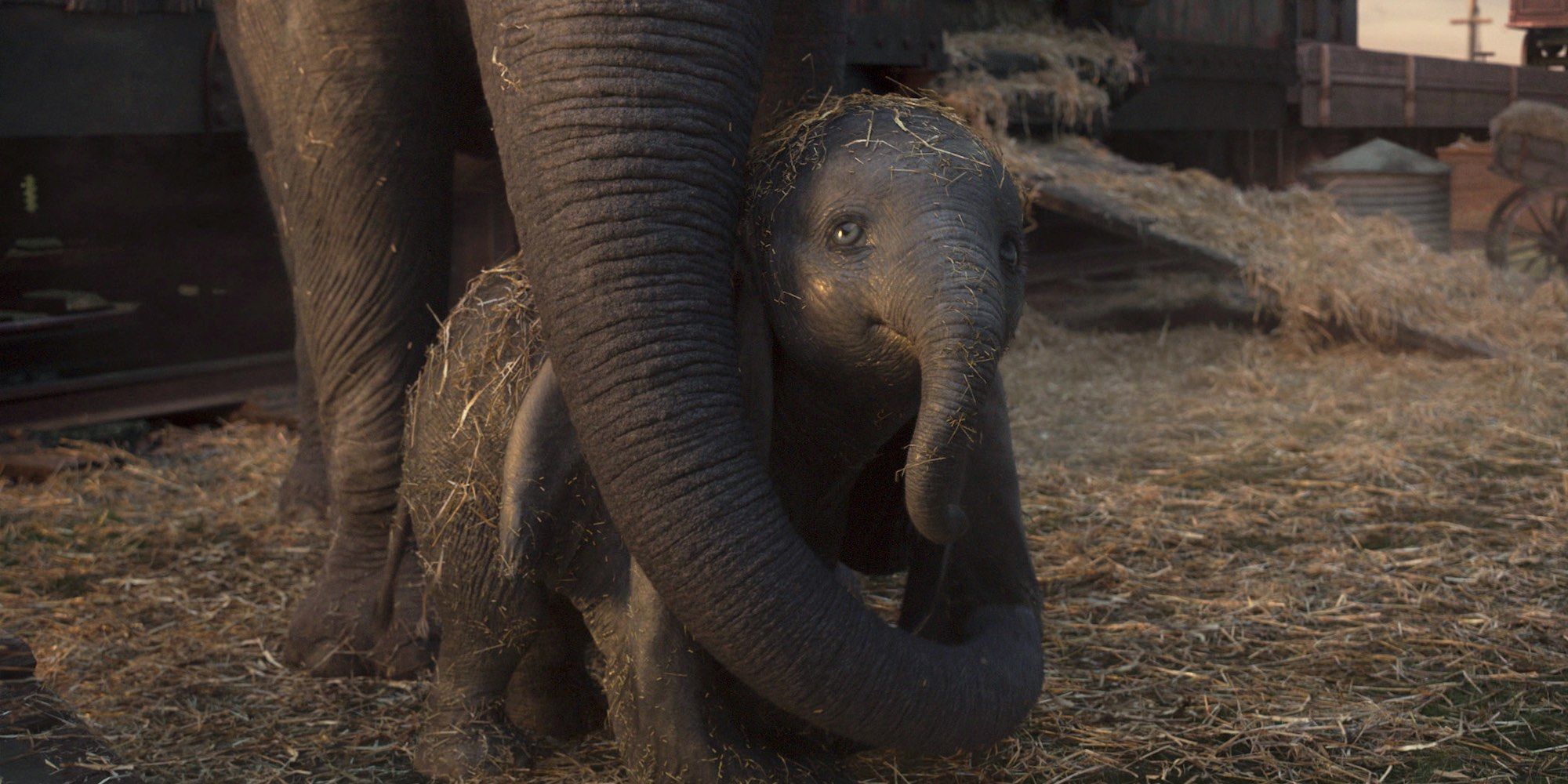Tim Burton’s live-action remake of Disney classic Dumbo is, accidentally, a rather cutting critique of Disney's recent acquisition of Fox. It’s been less than a fortnight since The Walt Disney Company finalized its deal to acquire 21st Century Fox and its myriad assets, but we’re already seeing the fallout of that merger and how it’s impacting the entertainment industry at large. The layoffs have started and Fox 2000, one of the company’s celebrated distributors of independent and smaller scale movies, is expected to shut down soon.
Critics of the acquisition have been vocal about the many negatives of the deal since it was announced in late 2017, although the might of Disney remains seemingly unconquerable. Now that the studio could control as much as 40% of the worldwide box office with its assembled assets, the House of Mouse is free to dominate the current entertainment landscape.
Related: Dumbo 2019 Changes: How Disney's Remake Tries To "Fix" The Original
Dumbo has so far received mixed reviews. While some have praised Burton's always beautiful visuals and the updates made to the story, others have criticized its overstuffed narrative and peculiar changes to help modernize and expand what remains one of Disney's smallest and quietest movies. The Dumbo of 2019 is now a story of a scrappy underdog family business going up against a dazzling corporate conglomerate that threatens to consume them. It plays as one hell of a Disney critique, especially in the immediate aftermath of the Fox deal.
Dumbo Criticizes Corporate Acquisitions Like the Disney/Fox Deal
The original Dumbo was a 64 minute cartoon based on a children's story that was made at Disney quickly and on the cheap, as an attempt to raise some revenue following the costly flop of Walt Disney's dream project, Fantasia. It ended up being the financially successful Disney film of the 1940s, made for half the cost of Snow White and the Seven Dwarfs. As such, it is a small and simple story about a baby elephant with big ears who is ostracized at the circus he lives in with his mother before discovering that he can fly. It hits a lot of the Disney tropes: Adorable anthropomorphic animals, sweet songs, a story about believing in yourself, and a few heart-breaking emotional beats. There are no subplots or deep thematic explorations beyond loving your family and yourself.
So, to turn the 2019 re-imagining of Dumbo into a two hour long big-budget effects extravaganza, Burton and screenwriter Ehren Kruger (writer of two Transformers movies) decided to give the story a corporate angle that hits very close to home. After Dumbo reveals himself to be a flying elephant, he becomes a media sensation and draws the attention of entertainment entrepreneur V. A. Vandevere, played to hammy delight by Michael Keaton. Arriving in a flurry of excitement, with seemingly everyone already aware of who he is, Vandevere offers the Medici Bros. Circus, headed by Danny DeVito, a deal. If they agree to be acquired by his mega circus, known as Dreamland, then they can be part of a bigger show and be worshipped by adoring crowds the world over.
As part of the deal, Max Medici is offered an executive role with Vandevere's company, and the circus’s workers are promised big news roles in the company. Of course, it’s all a ruse to ensure ownership of the true star of the Medici Bros. Circus: Dumbo. Once he is under their control and performing in a more polished act, Vandervere fires the other performers. Dumbo becomes essentially an amusement park attraction, one to be turned into merchandise and branding opportunities.
Of course, this film was obviously not intended to be a middle finger to Disney. Production was already underway by mid-2017, before the deal with Fox was even a whisper in the entertainment world. Tim Burton has a certain amount of creative freedom with Disney given how much money he’s made the company over the years, but it’s highly doubtful that Disney CEO Bob Iger would let even him go that far. The story is more a typical Hollywood narrative about the downtrodden little guys who prize art over commerce and who must grapple with the well-funded monopoly that could save them or destroy them in the blink of an eye. But while 20th Century Fox isn't exactly a humble little family business, the parallels are hard to ignore.
Page 2: The Villain of Dumbo is... Walt Disney?
The Villain of Dumbo is... Walt Disney?
Burton's Dumbo has the sort of narrative that’s easy to create emotional stakes from: The dynamic of the almighty businessman versus the struggling but loving family or community is familiar and one where audiences know instinctively where to put their loyalties. It’s one that Disney has used many times before; who is Cruella DeVil if not a rich businesswoman trying to buy out the dalmatians to get what she wants? The same can be said of King John and the Sheriff of Nottingham in Robin Hood. Disney loves a good villain and an underdog hero.
But the devil here is in the details. It’s not just that Vandevere is a businessman: It’s that he’s an amusement park king who is beloved by all he sees and whose branding is built on dreams, imagination and achieving the impossible. While he doesn’t look like him, everything in Michael Keaton’s performance is designed to evoke memories of Walt Disney. Dreamland itself is certainly more lavish and over-the-top than Disneyland ever has been, but the parallels are there, from the Tomorrowland stand-in to the rides.
Related: All The Live-Action Disney Remakes In Development
The moment of true awareness of these parallels comes when we see a stall selling Dumbo toys that are near identical to the ones available in every Disney Story for years now. Even the logo used to sell them is the one on the movie posters. It’s a moment of pure synergistic shamelessness that’s either genius or embarrassing, depending on how you look at it.
Disney’s might as an entertainment giant and beloved corporate force is undisputed. It's the only major movie studio working today that has managed to successfully brand itself and its output based on hyper-specific tropes: Fairy-tales, happy ever afters, dreams come true, and so on. The early days of Disney were buoyed financially by merchandising, with Walt Disney himself allegedly taking a hands-on role in ensuring every cuddly Mickey Mouse toy was ready for sale - and it worked. While Disney is now enormously powerful, it's still seen as the same sweet and family-friendly company that fans fell in love with growing up.
Even in the aftermath of the Fox acquisition with layoffs unfolding and the warnings of how this merger could effect the future of entertainment everywhere, there are plenty of Disney fans who can’t conceive of the company doing anything “mean.” So, in that context, seeing Disney release a $170 million movie where its entire business ethos is positioned as the threat to good cannot help but feel peculiar. Having the film come out as news of Fox layoffs fills the trades also creates a strange dynamic.
It doesn’t help that any satirical force created by the film feels immediately diluted when you realize you can go to Disney’s website and buy a cuddly Dumbo plush toy, along with an assortment of new tie-in merchandise, identical to the one in the film, a moment that’s supposed to symbolize the soullessness of selling out. Even when Disney mocks or derides itself, Disney ultimately wins in the end.




